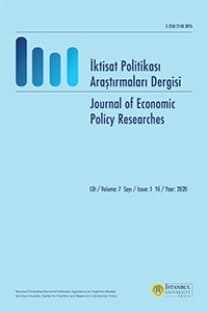TÜRKİYE’NİN TÜKETİM FONKSİYONU: YAPISAL KIRILMALI ZAMAN SERİSİ ANALİZİ (1998-2016)
Bir tüketim fonksiyonu, tüketim ile tüketimi etkileyebilecek değişkenler arasındaki ilişkiyi göstermektedir. Bu çalışmada Türkiye’nin tüketim fonksiyonu 1998-2016 yılları arasında çeyrek dönem veriler kullanılarak Yaşam Boyu Sürekli Gelir hipotezi çerçevesinde ampirik olarak analiz edilmiş ve tüketim harcamaları üzerinde faiz oranı ve gelirin etkisinin araştırılması amaçlanmıştır. Çeyreklik olarak toplanan veriler Fully Modified Ordinary Least Square (FMOLS) yöntemi kullanılarak tahmin edilmiş ve değişkenler arasındaki uzun dönem eşbütünleşme ilişkisinin incelenmesi için iki yapısal kırılmayı dikkate alan Hatemi-J eşbütünleşme testi uygulanmıştır. Türkiye’de, uzun dönemde özel nihai tüketim harcamaları ile gelir ve servet arasında anlamlı bir ilişki vardır ve tüketim, gelir ve servet tarafından belirlenmektedir. Kısa dönemli ilişkilerin incelenmesi için Hata Düzeltme Modeli oluşturulmuş ve bir dönemde oluşacak dengesizliğin tüketim harcamaları için yaklaşık yüzde 66’sı bir sonraki dönemde düzeltilerek denge değerine yaklaşması sağlanmaktadır.
Anahtar Kelimeler:
Tüketim fonksiyonu, eşbütünleşme testi, durağanlık, hata düzeltme mekanizmas
TURKEY'S CONSUMPTION FUNCTION: TIME SERIES ANALYSIS WITH STRUCTURAL BREAK (1998-2016)
A consumption function indicates the relationship between consumption and variables that may affect consumption. In this study, Turkey's consumption function has been analyzed in the framework of life cycle-permanent income hypothesis using quarterly data between the years 1998-2016.The purpose of this article is to investigate the effect of interest rate and income on consumption expenditures. Fully Modified Ordinary Least Saquare (FMOLS) method was used to estimate the long term cointegration relationship between the variables and Hatemi-J cointegration test was applied. The test takes account of two structural breaks. In Turkey, there is a significant relationship between the private final consumption expenditure and income in the long term and also consumption is determined by income and wealth. For analysis of short-term relationship, Error Correction Model (ECM) was established and according to the results about %66 of imbalances in consumption expenditures are in balance in the next period.
___
- Brown, R., Durbin, J., & Evans, J. (1975). Techniques for Testing the Constancy of Regression Relations over Time. Journal of Royal Statistical Society, Series B, 37, 149-163 .
- Cook, S. (2005 ). “The Nonstationarity of the Consumption-Income Ratio: Evidence from More Powerful Dickey-Fuller Tests. Applied Economics Letters, 393-395.
- Diulio, E. A. (1988). Schaum’s Outline of Theory and Problems of Macroeconomic Theory, Gökdere A.(Çev.). İstanbul: 3. Baskı, Türkiye Ekonomi Kurumu.
- Duesenberry, J. (1949). Income, Saving and the Theory of Consumer Behavior. Cambridge: Harvard University Press.
- Gujarati, D. N. (1999). Temel Ekonometri, (Çev. Ü. Şenesen ve G.G. Şenesen). İstanbul: Literatür Yayıncılık.
- Güreşçi, G. P., & Utkulu, U. (2007). Türkiye'nin Tüketim Fonksiyonu: Parçalı Hata Düzeltme Modeli Bulguları. Akdeniz İ.İ.B.F. Dergisi (14), 39-65.
- Hall, R. E. (1978). Stochastic Implications of the Life Cycle-Permanent Income Hypothesis: Theory and Evidence. The Journal of Political Economy, 976.
- Hatemi-J, A. (2008). Tests for Cointegration with Two Unknown Regime Shifts with an Application to Financial Market Integration. Empirical Economics (s. 497-505). içinde Keynes, J. M. (1936). General Theory of Employment, Interest and Money. London: Macmillan and Co. Ltd.
- Kuznets, S. (1946). National Product Since 1869, National Bureau of Economic. New York.
- Larrian, J. S. (1993). Macroeconomics in The Global Economy. New Jersey: Prentice Hall.
- Mankiw, N. G. (1992). Macroeconomics. United States of America: Worth Publishers, Inc.
- Modigliani, F. (1963). "The Life Cycle Hypothesis of Saving: Aggregate Implications and Tests. American Economic Review, 55-84.
- Sevüntekin, M., & Nargeleçekenler, M. (2010). Ekonometrik Zaman Serileri Analizi - Eviews Uygulamalı. Geliştirilmiş 3. Baskı: Nobel Yayın Dağıtım.
- Ünsal, E. M. (2011). Makro İktisat. Ankara: İmaj. 33
- Yayın Aralığı: Yılda 2 Sayı
- Başlangıç: 2014
- Yayıncı: İstanbul Üniversitesi
Sayıdaki Diğer Makaleler
IMPACT OF INTERNAL (MICRO) AND EXTERNAL (MACRO) FACTORS ON PROFITABILITY OF INSURANCE COMPANIES
Anum RASHID, Muhammad Usman KEMAL
GLOBALIZATION, INCOME INEQUALITY AND INCOME DISTRIBUTION: NEW EVIDENCES FROM DEVELOPED COUNTRIES
YÜKSEK DENETİMİN TARİHSEL GEÇMİŞİ VE AVRUPA BİRLİĞİ’NDE YÜKSEK DENETİM
TÜRKİYE’NİN TÜKETİM FONKSİYONU: YAPISAL KIRILMALI ZAMAN SERİSİ ANALİZİ (1998-2016)
